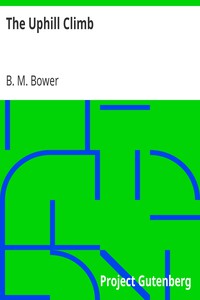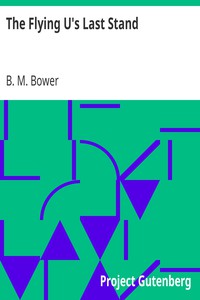The Uphill Climb by B. M. Bower (fiction book recommendations .txt) 📗

- Author: B. M. Bower
Book online «The Uphill Climb by B. M. Bower (fiction book recommendations .txt) 📗». Author B. M. Bower
Ford was not worrying about Sunset half as much as Sunset was worrying about him. He was at that moment playing pinochle half-heartedly with a hospitable sheep-herder, under the impression that, since his host had frankly and profanely professed a revulsion against solitaire and a corresponding hunger for pinochle, his duty as a guest lay in satisfying that hunger. He played apathetically, overlooked several melts he might have made, and so lost three games in succession to the gleeful herder, who had needed the diversion almost as much as he needed a hair-cut.
His sense of social responsibility being eased thereby, Ford took his headache and his dull disgust with life to the wall side of the herder's frowsy bunk, and straightway forgot both in heavy slumber, leaving to the morrow any definite plan for the near future—the far future being as little considered as death and what is said to lie beyond.
That day had done for him all he asked of it. It had put him thirty miles and more from Sunset, against which he felt a resentment which it little deserved; of a truth it was as inoffensive a hamlet as any in that region, and its sudden, overweening desire for a jail was but a legitimate impulse toward self-preservation. The fault was Ford's, in harassing the men of Sunset into action. But several times that day, and again while he was pulling the stale-odored blankets snugly about his ears, Ford anathematized the place as "a damned, rotten hole," and was as nearly thankful as his mood would permit, when he remembered that it lay far behind him and was likely to be farther before his journeyings were done.
Sleep held him until daylight seeped in through the one dingy window. Ford awoke to the acrid smell of scorched bacon, thought at first that Sandy was once more demonstrating his inefficiency as a cook, and when he remembered that Sandy's name was printed smudgily upon that page of his life which he had lately turned down as a blotted, unlearned lesson is pushed behind an unwilling schoolboy, he began to consider seriously his next step.
Outside, the sheep were blatting stridently their demand for breakfast. The herder bolted coffee and coarse food until he was filled, and went away to his dreary day's work, telling Ford to make himself at home, and flinging back a hope of further triumphs in pinochle, that night.
Ford washed the dishes, straightened the blankets in the bunk, swept the grimy floor as well as he could with the stub of broom he found, filled the wood-box and then, being face to face with his day and the problem it held, rolled a cigarette, and smoked it in deep meditation.
He wanted to get away from town, and poker games, and whisky, and the tumult it brewed. Something within him hungered for clean, wind-swept reaches and the sane laughter of men, and Ford was accustomed to doing, or at least trying to do, the thing he wanted to do. He was not getting into the wilderness because of any inward struggle toward right living, but because he was sick of town and the sordid life he had lived there.
Somewhere, back toward the rim of mountains which showed a faint violet against the sky to the east, he owned a friend; and that friend owned a stock ranch which, Ford judged, must be of goodly extent; two weeks before, hearing somehow that Ford Campbell was running a poker game in Sunset, the friend had written and asked him to come and take charge of his "outfit," on the plea that, his foreman having died, he was burdened with many cares and in urgent need of help.
Ford, giving the herder's frying-pan a last wipe with the dish-cloth, laughed at the thought of taking the responsibility offered him in that letter. It occurred to him, however, that the Double Cross (which was the brand-name of Mason's ranch) might be a pleasant place to visit. It was long since he had seen Ches—and there had been a time when one bed held the two of them through many a long, weary night; when one frying-pan cooked the scanty food they shared between them. And there had been a season of grinding days and anxious, black nights between, when the one problem, to Ford, consisted of getting Ches Mason out of the wild land where they wandered, and getting him out alive. The problem Ford solved and at the solution men wondered. Afterward they had drifted apart, but the memory of those months would hold them together with a bond which not even time could break—a bond which would pull taut whenever they met.
Ford set down the frying-pan and went to the door and looked out. A chinook had blown up in the night, and although the wind was chill, the snow had disappeared, save where drifts clung to the hollows, shrinking and turning black beneath the sweeping gusts; sodden masses which gave to the prairie a dreary aspect of bleak discomfort. But Ford was well pleased at the sight of the brown, beaten grasses. Impulse was hardening to decision while he stared across the empty land toward the violet rim of hills; a decision to ride over to the Double Cross, and tell Ches Mason to his face that he was a chump, and have a smoke with the old Turk, anyway. Ches had married, since that vividly remembered time when adventure changed to hardship and hazard and walked hand in hand with them through the wild places. Ford wondered fleetingly if matrimony had changed old Ches; probably not—at least, not in those essential man-traits which appeal to men. Ford suddenly hungered for the man's hearty voice, where kindly humor lurked always, and for a grip of his hand.
It was like him to forget all about the herder and the promise of pinochle that night. He went eagerly to the decrepit little shed which housed Rambler, his long-legged, flea-bitten gray; saddled him purposefully and rode away toward the violet hills at the trail-trot which eats up the miles with the least effort.
That night, although he slept in a hamlet which called itself a town, his purpose kept firm hold of him, and he rode away at a decent hour the next morning,—and he rode sober. He kept his face toward the hills, and he did not trouble himself with any useless analysis of his unusual temperateness. He was going to blow in to the Double Cross some time before he slept that night, and have a talk with Ches. He had a pint of fairly good whisky in his pocket, in case he felt the need of a little on the way, and beyond those two satisfactory certainties he did not attempt





Comments (0)